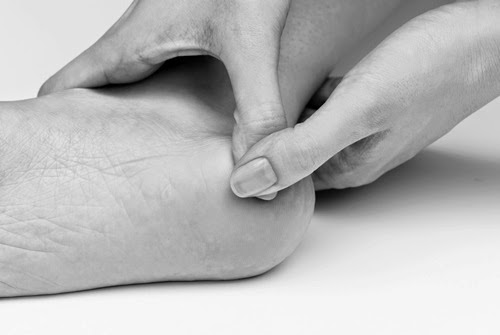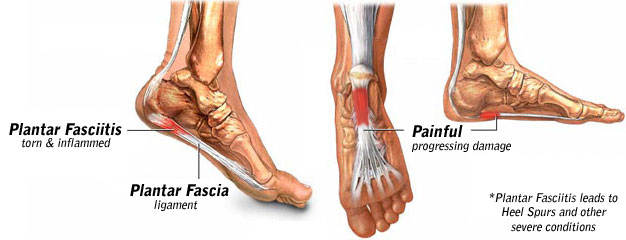
Heel Pain and Solutions
July 2017
With the summer months now upon us, people will undoubtedly seek out more outside sources for activity in order to enjoy the nice weather. Whether you’re a regular walker, jogger, recreational sport player, or just an individual trying to be more active, one common unintended consequence of increasing your activity levels is heel pain. Heel pain can be due to a wide variety of causes, though the two common causes that will be discussed here are plantar fasciitis and fat pad syndrome.
Plantar fasciitis is a well-known yet commonly misunderstood source of heel pain. As the name suggests, plantar fasciitis is thought to be an inflammation of the structure on bottom part, or plantar region, of the feet. Predisposing factors for plantar fasciitis are increased body mass, being flat-footed, having sudden increase in physical activity levels, and inadequate shoe support, among others. Plantar fasciitis is typically diagnosed clinically, meaning no additional medical tests and imaging is required. The mainstay of treatment for plantar fasciitis is physical therapy, where we can employ hands-on manual therapy techniques, provide specific exercises to help decrease pain and increase your daily activities, provide recommendations for shoes and orthotics, and prescribe a home program to give you the power of helping treat yourself.

Fat pad syndrome is another common, yet relatively unknown cause of persistent heel pain. Under your heel, there exists an area of fat which assists in padding the heel during walking and running activities. In certain instances, this amount of cushioning becomes painful and can no longer serve as a proper shock absorber. Fat pad syndrome is common in people who are active in repetitive jumping activities such as basketball and long distance running, though is most common in overweight individuals. This condition can also be diagnosed clinically, and physical therapy can help greatly. Treatment often involves education about activity modifications to allow the area to heal, applying certain taping methods, and assisting in providing custom orthotics, if needed.
Heel pain due to plantar fasciitis can persist for months if not appropriately treated by a medical professional. At Intermountain Physical Therapy, our goal is to get you back to doing what you love most, as soon as possible. If you’re experiencing heel pain, give us a call at any of our four convenient locations, and we’ll start you on the path of feeling and moving better.
Ian M. Campbell PT, DPT
